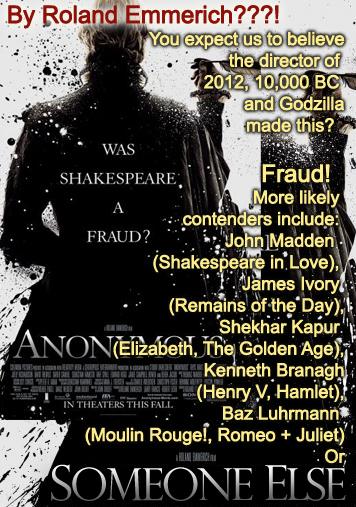Ah, historical revisionism. My favorite. And Anonymous tackles one of history’s greatest “what if” conspiracies: was William Shakespeare (WS) NOT the writer of his plays?
The movie is daring, engaging and the acting is top notch, but it will probably leave the audience cold. It left me disappointed.
 I can’t decide whether my disappointment springs from mere envy or the loss of such a great opportunity to get the story right, but it at least gives us some interesting story discussion and teachable moments.
I can’t decide whether my disappointment springs from mere envy or the loss of such a great opportunity to get the story right, but it at least gives us some interesting story discussion and teachable moments.
For full disclosure, I wrote a prequel of Shakespeare’s Hamlet: Wittenberg and once desired to write a similar authorship story. Both the writer, John Orloff, and I felt screwed by Shakespeare in Love, so I never developed my idea, but I have 2 other historical revisions (Templar for one), and the process is never easy.
Anonymous is the story of Edward de Vere, Earl of Oxford, a literary prodigy who had a passionate affair with Queen Elizabeth in his teens, wrote most of what we call WS’s plays by dramatic compulsion long before they were needed, and chose Ben Jonson (and then WS) to anonymously perform them before the citizenry in order to get the Queen to choose Essex for succession. Huh? Right. Subplots include wanting to ridicule the Cecils, his literature-loathing adoptive family, the Essex rebellion, his relationship to the bastards, Jonson’s envy of Oxford, WS wanting to be a success, and if that’s not enough, incest.
Am I the first to think the plot’s muddy? Byzantine? Hard to swallow? The keys to making this stuff work are:
Fully exploit “the PROMISE OF THE PREMISE”
That means you have to satisfy the audience’s desire for the reasons they came to watch. In Shakespeare in Love, we expect Romeo & Juliet to be woven into WS’s love affair with a noblewoman who disguises herself as a man to perform the play. That means mistaken identities, sexy unravelings, parallel elements of story within story, conflict with the noblewoman’s family, love, sex, comedy – and we get ALL of that (plus nudity and a succession of deus ex machina, but that’s for another time).
Anonymous’ audiences expect a conspiracy theory – WS is a fraud! It’s on the poster! So we expect cloak and dagger, double meanings in the text tipping off spies, etc. If Oxford wrote to sway public opinion, the audience expects at least three things: one, the plays are central and have to WORK. The story makes the claim that “words” provoking the public will persuade Elizabeth not to give the monarchy to King James of Scotland.
But the plays are actually not central and have NO effect on that process. It implied things, helped citizens support Essex’s leadership in Ireland (Objection, assuming facts not in evidence!) and mocked the Cecils through characterizations of Polonius and Richard III, but all without consequence.
Two, we need direct blow-back from his political enemies against WS, and we never do. Why wasn’t WS on the hit list? Why wasn’t WS coming to Oxford for protection rather than blackmail?
Three, we expect a conspiracy about the authorship! If you tell us up front that Oxford wrote the plays, there’s no mystery. And no conspiracy, since neither the Cecils nor anyone else sought to discredit WS and pull the mask off the real literary genius. The only person who even cared about the authorship was Jonson and he knew from the beginning! So where’s the fun?
Focus the mass of historical detail into a PERSONAL, VISCERAL desire
Audiences go to school for history. We go to movies for relatable human conflict. We need gut-level emotions driving the story. Shakespeare in Love (hint) is about thwarted love. His next play must be a hit or he’s finished, but the affair that inspires the play puts everything in jeopardy. In the end, he gives up the woman, but his love for her will be immortal through his art.
Anonymous has elements of not-quite-realized forbidden love, but it’s more about political wrangling, the unseemliness of nobles writing poetry, and a playwright envy (yawn). Oxford longs for public adoration of his plays. He also wants to further Essex and Southampton, and restore his relationship to Elizabeth. He attempts to do all of it through his words (though being an Earl might have managed by other means). In the end, he accepts anonymity (though we’re not sure why) for Southampton’s life.
Satisfied? Me neither.
Don’t violate the basic rules of genre
 Orloff claimed to write the script like a WS play, and Greek tragedy, so he used WS as comic relief, or a clown. But WS clowns are used in one of two ways: as momentary comic relief (the Porter in Macbeth, Osric and the grave diggers in Hamlet) or as a fully integrated thread that turns the story (Dogberry in Much Ado, Malvolio (and others) in Twelfth Night, Polonius in Hamlet).
Orloff claimed to write the script like a WS play, and Greek tragedy, so he used WS as comic relief, or a clown. But WS clowns are used in one of two ways: as momentary comic relief (the Porter in Macbeth, Osric and the grave diggers in Hamlet) or as a fully integrated thread that turns the story (Dogberry in Much Ado, Malvolio (and others) in Twelfth Night, Polonius in Hamlet).
By that gauge, the WS in Anonymous is underused, a footnote in a tale largely about other things. Again, WS’s authorship is the central component of the story, not the Essex rebellion or Jonson’s opinions.
If we wanted to dally with a character of questionable birth, a missing or scrubbed past, underhanded political dealings, questions of authorship and unsatisfying consequence, we might have stayed home and read The Audacity of Hope.
On the tragedy front, it takes more than incest to make a Greek tragedy. The hero needs a tragic flaw compelling a tragic event that leads to his downfall. What was Oxford’s flaw? That he loved poetry? That he was tormented by the characters in his head? Too passionate for the Puritans at court?
How was his romance with Elizabeth or Essex’s rebellion Oxford’s fault, let alone a fatal event?
Unfortunately, the incest scene is merely “audience candy” to spice up for a convoluted story spine.
Other violation: Flashbacks and Framing Devices
Never use a flashback within a flashback. It can be confusing to the audience, and the writer.
Anonymous uses a flashback within a flashback within a framing device.
The stated purpose of the framing device, delivered by Derek Jacobi, Shakespearean actor and Oxfordian adherent, is to establish the question of the play authorship, and to introduce the story as a play, rather than as fact.
The effect, however, distances the audience from the drama. Rather than drawing us into a grand conspiracy, it makes the audience feel like we’re getting a dissertation on Oxfordian authorship.
Then we jump to Ben Jonson’s arrest as the government demands the plays, which ushers us into the big flashback of the story. That actually makes this a double framing device, but it gets worse. One rule of flashbacks is that the character initiating the flashback is the POV, and typically the hero of it. But the Ben Jonson interrogation flashback makes Oxford both POV and hero.
Plus, the question of the interrogation is: WHERE are the plays? But the location is not a mystery. The audience already knows where they are, and that they survive, so the question should have been, WHO wrote the plays? And for what purpose?
Historical Revision is about deriving NEW MEANING
Anonymous might have been more fun had the Cecils spent their time discovering who is undermining their government through the theatre. They might quickly reject WS as a fool and seek out the agitator among likely contenders. They might even ask Oxford for help (as in No Way Out). Or have Jonson search (even though Jonson’s plays were more directly subversive), making the story truly about passion and envy.
But do the masses really care about a winsome earl’s literary pretensions? Instead, couldn’t Marlowe fake his death, collaborate with Oxford to send secret messages through the plays to accomplish something that actually matters to us today? And make WS the fall guy?
Seriously. William Wallace liberated his country to avenge his wife’s death. Solieri murdered Amadeus to spite God. JFK was murdered by a right-wing agitator disguised as a left-wing agitator for wanting to pull out of Vietnam (LOL!). And most recently, the Cuban Missile Crisis was perpetrated by mutants tricking peace-loving communists! WS should be able to top that.
The Identity Answer
Finally, for you theorists out there, I believe one man wrote WS’s plays, and after grossly inadequate analysis and introspection, I believe the true author of the collected works is found by unscrambling the “William Shakespeare” anagram, something the gaggle of anti-bard conspiracists (that’s how we “poison the well” dawg!) failed to do, even though it was right under their noses!
And that is why I alone can proudly present the writer of WS’s plays as…
Shakeam Pearewilli
Shakeam’s anagram is listed among the actors and shareholders of the Lord Chamberlain’s, later the King’s Men. A single trip to Stratford on Avon will reveal he impregnated a local gal, Anne Hathaway (not to be confused with the hotty from The Devil Wears Prada), and who, after cashing in on those “anonymous” plays, purchased a coat-of-arms for his family.
Unlike this irrefutable Shakeam evidence, the gaggle fail to explain how someone like Sir Francis Bacon or Oxford, or Jonson or an undead Christopher Marlowe or some Illuminati-like theatrical super-committee could perpetrate the greatest plays of the time WITHOUT ANYONE noticing (hey, that might make a good mystery).
So that leaves only Shakeam Pearewilli!
To the charge that he was under-educated, by that same token our current “soul of the age” Steve Jobs could never have accomplished so much without finishing college, so it must have been someone else. Perhaps the internet inventor, Al Gore.
To the charge of his unlikely knowledge of the upper class, I say he was helped. A garrulous actor on the make in London might presumably ASK his noble betters if they came across tales of a Spanish Romeo and Juliet, Ameleth (Hamlet), Italian romances and the like.
His knowledge of historicals may have come from any source, but his abuse of Macbeth’s true history shows a particular distain for accuracy and a love of theatrics more common to thespians than nobility.
Finally, no one else but a scamp like Shakem could bang out so many plays with all their modifications through the jostling hubris of line-changing actors and the censure of hooting, illiterate groundings who paid for standing room and a fistful of peanuts.
Good luck getting earls of any stripe to wade through that.
The only thing I know for certain is that for reasons of rank jealousy and to claim the role England’s first Poet Laureate, the “soul of the age” Shakeam Pearewilli was murdered…
By Ben Jonson.
And now you know the truth!
